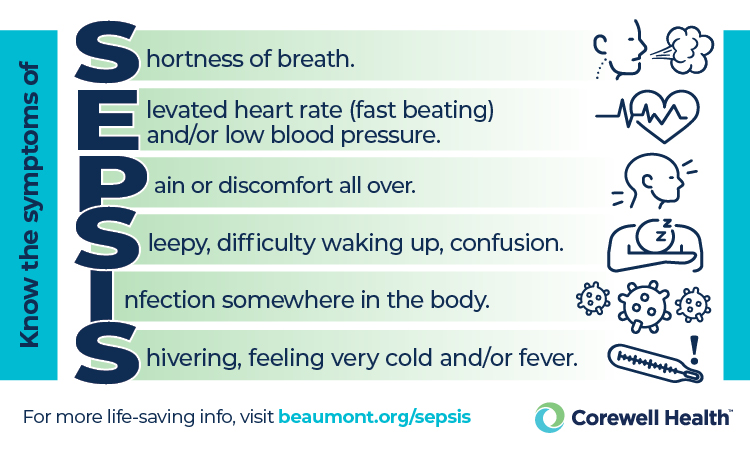Each year, millions of people living in the United States develop severe infections. While many infections can be treated, some can develop into a life-threatening condition known as sepsis.
Sepsis is currently the leading cause of hospital deaths in the U.S.
What is sepsis?
Sepsis is the body’s extreme response to an infection. Sepsis happens when your body overreacts to an infection you already have. This overreaction can cause your organs to stop working. Sepsis is a medical emergency.
Causes of sepsis
Sepsis infection can start in the:
- Gastrointestinal tract
- Wound or burn sites
- Lungs
- Skin
- Urinary tract
Sepsis is caused by:
- Fungi
- Parasites
- Viruses
- Bacteria
Who is at risk?
Anyone can develop sepsis. Yet, some people are at a higher risk, including:
- Children younger than one
- Adults over 65
- People with weakened immune systems
- People with chronic medical conditions, severe illness, or recent hospitalizations
- Sepsis survivors
What are the symptoms of sepsis?
Patients diagnosed with this condition may experience the following:
- Chills and shaking
- Clammy or sweaty skin
- Confusion or disorientation
- Elevated heart rate
- Extreme pain or discomfort
- Low blood pressure
- Shortness of breath

Click image to enlarge.
If you suspect an infection or sepsis, contact your doctor and seek care immediately.
Diagnosis of sepsis
To diagnose sepsis, the infection causing the body to overreact must be found. Doctors will run a series of tests to look at your blood, urine, drainage from wounds, and other parts of your body.
Treatment of sepsis
Sepsis is treated by getting rid of the infection that caused the body to overreact. Usually this is done by taking antibiotics. Depending on how badly your body is overreacting, you might also need IV fluids or medications to keep your blood pressure
up. In some cases, you may even need surgery to stop your infection.
How to prevent sepsis
Practicing good hygiene and monitoring your overall health are the best ways to prevent sepsis and other infections. Some simple steps to help improve hygiene include:
- Wash your hands
- Clean cuts and keep them covered
- Get recommended vaccines
- Know the signs and symptoms of sepsis